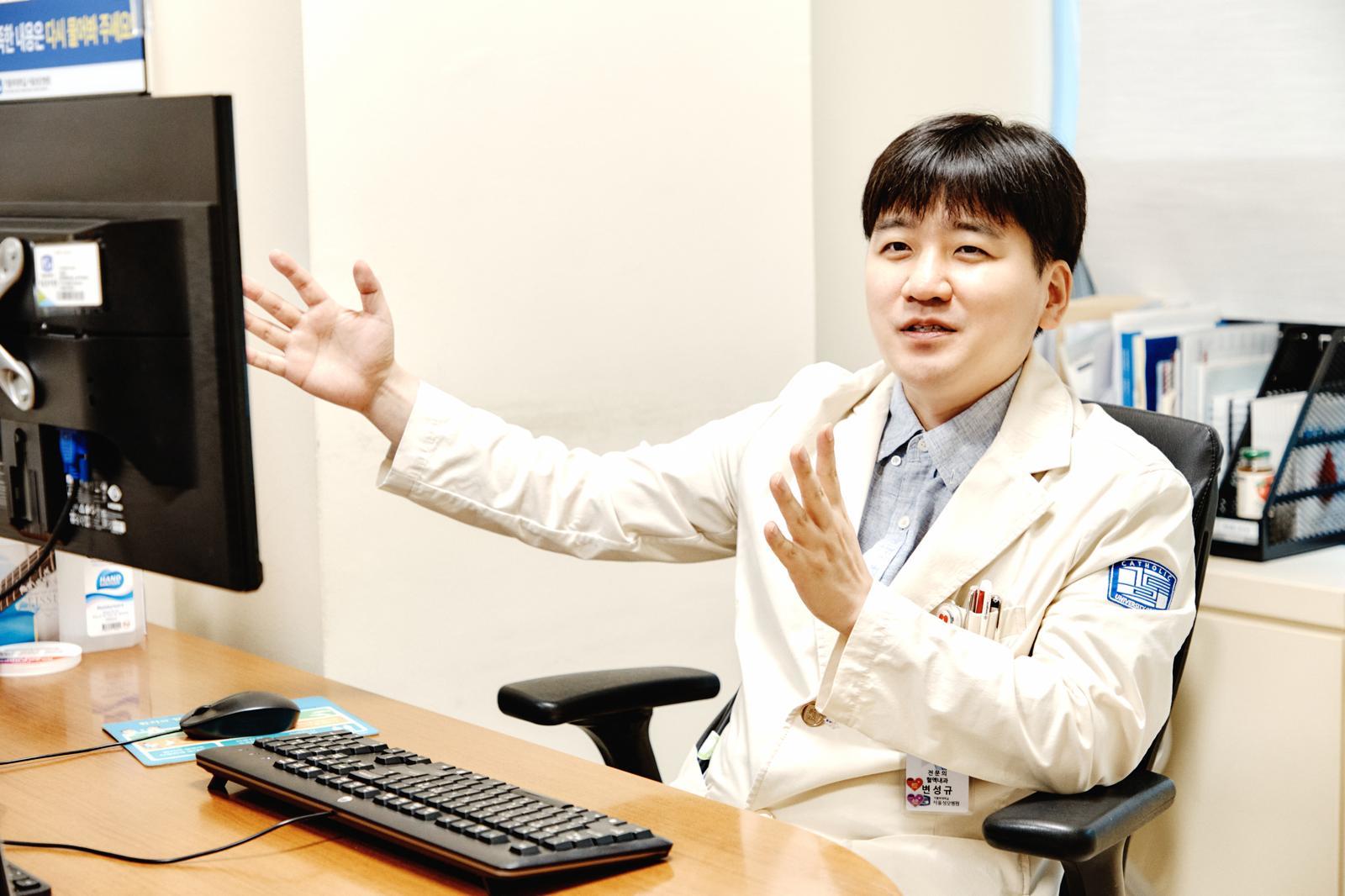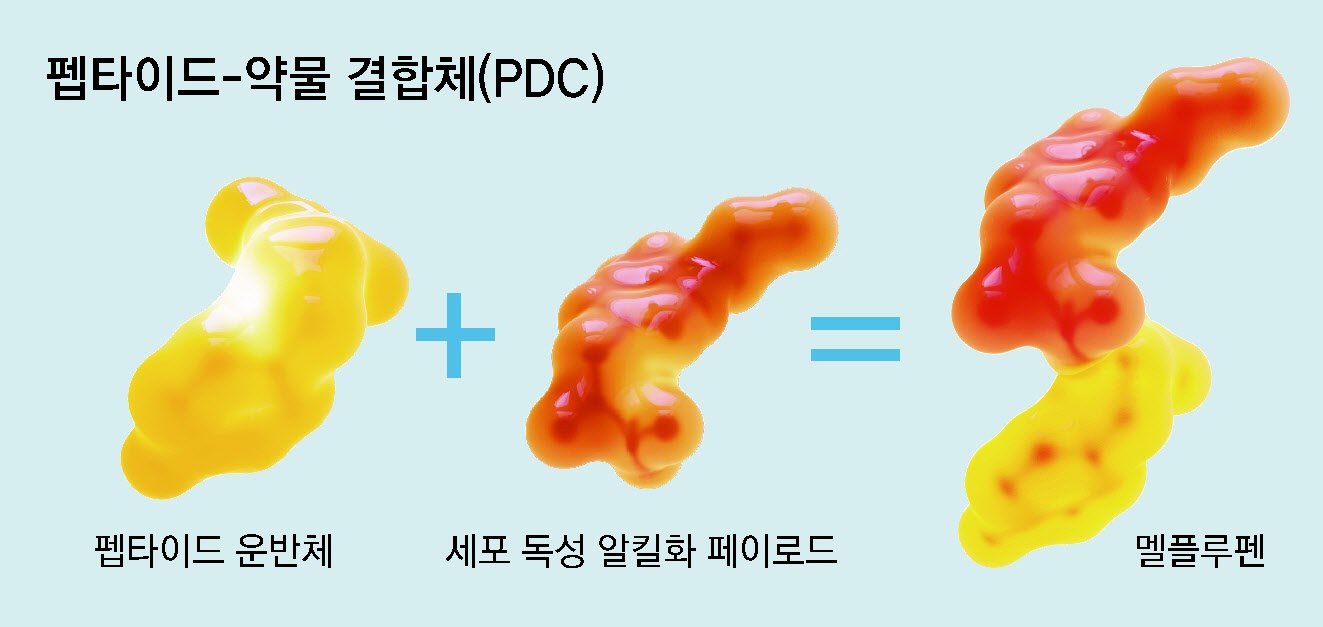
Medical / Drug Development
'Pepaxst' Emerges as New Multiple Myeloma Treatment
Dong-A Ilbo |
Updated 2025.10.29
Peptide-drug conjugate-based cancer treatment expands options for triple-negative patients
‘KRW 18.01 million per month’ drug cost—SC Bio begins 'humanitarian support' for non-medical expenses
Reducing patient burden and providing treatment opportunities
‘KRW 18.01 million per month’ drug cost—SC Bio begins 'humanitarian support' for non-medical expenses
Reducing patient burden and providing treatment opportunities
Professor Byun Sung-kyu from the Department of Hematology at Seoul St. Mary's Hospital explains the new treatment option 'Pepaxst' for patients with relapsed/refractory multiple myeloma. Provided by SC Bio
SC Bio, a biotechnology company, has launched a humanitarian drug cost support program for 'Pepaxst (ingredient name: Melphalan Flufenamide)', which is being used domestically as an 'autologous treatment' for patients with relapsed/refractory multiple myeloma.Pepaxst is the world's first peptide-drug conjugate (PDC) anticancer drug that activates the drug using enzymes overexpressed in cancer cells, maintaining anticancer effects while reducing damage to normal cells with its innovative mechanism.
It is designed to be selectively activated by specific enzymes within cancer cells by conjugating a melphalan derivative to a peptide carrier. This allows for maintaining anticancer effects while minimizing side effects. Additionally, it is easier to synthesize and has lower production costs than antibody-drug conjugates (ADC), and its smaller molecular weight allows for better tissue penetration, which is expected to reduce drug costs and improve administration convenience.
Notably, it does not directly deplete T-cells, allowing its use even after existing immunotherapy, making it a complementary treatment option.
Limited Treatment Options for Triple Refractory Patients, New Alternative Expected
Professor Byun Sung-kyu from the Department of Hematology at Seoul St. Mary's Hospital pointed out, "For patients with relapsed/refractory multiple myeloma, the treatment methods covered by health insurance after the third line are virtually limited, and especially after daratumumab treatment, the options are very narrow."
For triple class refractory patients who have failed existing treatments more than three times, the progression-free survival (PFS) is only 4.6 months, and the overall survival is 13.8 months, indicating a lack of standard treatment. Professor Byun emphasized, "CAR-T cell therapy or bispecific antibody therapy is highly effective but has limited accessibility due to high costs and long waiting periods," stressing the urgent need for new mechanism treatments.
Seoul St. Mary's Hospital has already registered its first patient and started treatment. Professor Byun reported, "So far, there have been relatively few side effects, and with only monthly dosing, there is high compliance," adding that "it significantly reduces the burden of daily life, receiving positive responses from both patients and families."
SC Bio's humanitarian patient support program prioritizes triple refractory or similarly conditioned patients. Starting with an initial 20 patients, it will gradually expand, fully supporting the high-cost drug priced at approximately KRW 18.01 million per month. Administration is completed with a 30-minute intravenous injection every 28 days, and patients whose health insurance premiums are below KRW 100,000 per month (KRW 200,000 for regional subscribers) and annual property tax is below KRW 1 million can receive up to KRW 10 million in support, including non-medical expenses such as transportation, caregiving, and testing. Program applications can be guided through hospitals or SC Bio.
Listed in European Treatment Guidelines and Clinical Evidence Secured… Hope for Domestic Patients
In the subgroup analysis of the phase 3 OCEAN study, progression-free survival more than doubled in patients who had not received autologous stem cell transplantation (ASCT) or had more than three years post-transplant compared to the control group. Based on these results, European regulatory authorities approved the indication for 'relapsed/refractory patients who have passed more than three years after autologous transplantation.'
Similar efficacy and safety have been confirmed in actual clinical settings. In a single-institution study in Italy, an objective response rate (ORR) of 47% was reported in triple refractory multiple myeloma patients, supporting the efficacy confirmed in clinical trials. In a Spanish multicenter study, an ORR of 26% was observed, with significant treatment responses noted even in patient groups that had already used immunotherapy. The research team at the Dana-Farber Cancer Institute at Harvard Medical School also reported a 55% response rate and manageable side effects, demonstrating consistent effects with existing clinical results.
In the OCEAN study subgroup analysis, among patients who received at least three treatments and had not undergone autologous transplantation or had more than three years post-transplant, the median PFS for the Pepaxst-dexamethasone combination group was 9.3 months, more than double that of the control group (pomalidomide-dexamethasone) at 4.6 months.
Consequently, while the indication was approved in Europe, it was not recognized in the United States, leading to the withdrawal of accelerated approval. However, Professor Paul Richardson of Harvard Medical School stated, "This is unrelated to the drug's safety or efficacy." Professor Byun evaluated, "Triple refractory multiple myeloma patients have very few treatment options and poor prognosis," adding, "This program is a first step in alleviating economic burdens and providing new treatment opportunities." He concluded, "Given that the drug's clinical benefits have been proven in real-world data and European guidelines, it will be a meaningful hope for domestic patients."
Choi Hae-jin
AI-translated with ChatGPT. Provided as is; original Korean text prevails.
ⓒ dongA.com. All rights reserved. Reproduction, redistribution, or use for AI training prohibited.
Popular News












